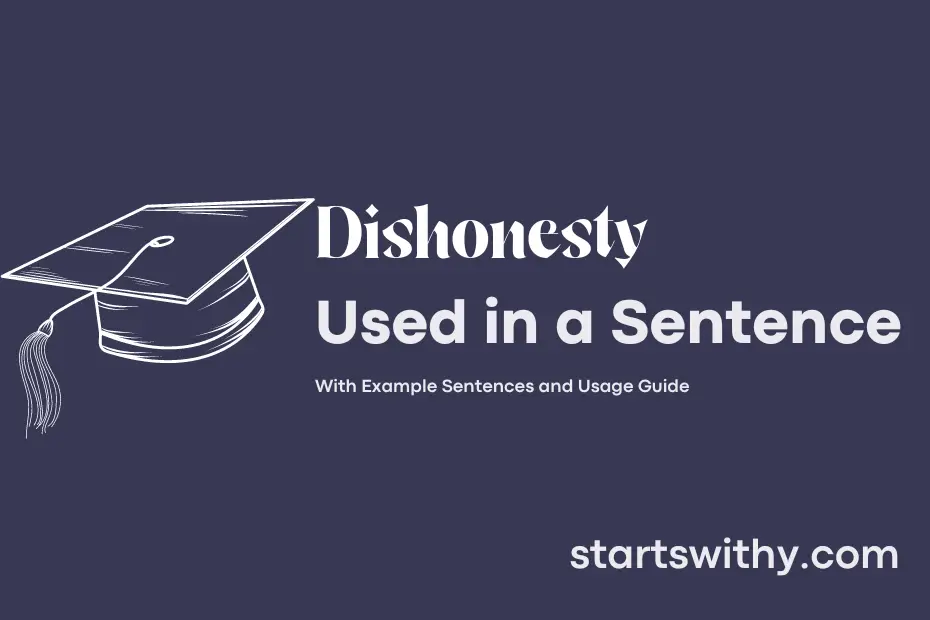Dishonesty is the act of intentionally deceiving others by distorting the truth or withholding important information. It is a behavior that undermines trust and integrity in personal relationships, professional settings, and society as a whole.
Whether it’s a white lie to avoid hurting someone’s feelings or a more serious deception with harmful consequences, dishonesty can have far-reaching implications. It erodes credibility, damages relationships, and can ultimately lead to betrayal and broken trust.
7 Examples Of Dishonesty Used In a Sentence For Kids
- Mommy says that telling the truth is important and we should never use dishonesty.
- I should always be honest with my friends and not use dishonesty.
- We must never cheat in games or tests because that is a form of dishonesty.
- Using dishonesty can hurt other people’s feelings and make them sad.
- We should always be honest and never use dishhonesty to get what we want.
- It is important to always speak the truth and avoid using dishonesty.
- When we use dishonesty, it can lead to problems and make things worse.
14 Sentences with Dishonesty Examples
- Dishonesty during exams can lead to severe consequences such as expulsion.
- Plagiarism is a form of dishonesty that can result in failing a course.
- Cheating in group assignments shows a lack of integrity and dishonesty.
- Using someone else’s research as your own is considered an act of dishonesty in academia.
- Fabricating data for a research paper is a serious form of dishonesty.
- Turning in a paper that was purchased online is a clear example of dishonesty.
- Misrepresenting your qualifications on a resume is a form of dishonesty that can harm your future career.
- Taking credit for someone else’s work is an act of dishonesty that can ruin your reputation.
- Lying to professors about missing deadlines displays a lack of honesty and dishonesty.
- Exaggerating your accomplishments on a scholarship application is a form of dishonesty that can lead to disqualification.
- Inflating your grades on a transcript is an act of dishonesty that can eventually catch up to you.
- Falsifying a signature on a permission slip is a form of dishonesty that can lead to disciplinary action.
- Misrepresenting your financial status on a scholarship application is a form of dishonesty that can impact other deserving candidates.
- Taking credit for a group project without contributing your fair share is a display of dishonesty that can harm your relationships with classmates.
How To Use Dishonesty in Sentences?
To use the word Dishonesty in a sentence, you need to first understand its meaning. Dishonesty refers to the act of being untruthful or deceiving someone.
Here is a simple guide on how to use the word Dishonesty in a sentence:
-
Identify the situation: Think about a scenario where someone is not telling the truth or being deceitful.
-
Construct the sentence: Start by introducing the situation or context where dishonesty is taking place. For example, “The student’s constant dishonesty about completing his homework was beginning to raise suspicions.”
-
Place the word Dishonesty appropriately: Insert the word Dishonesty in the sentence where it best fits and conveys the intended meaning.
-
Review and revise: After using the word Dishonesty in the sentence, read it aloud to ensure it makes sense and effectively communicates the idea of deceit or untruthfulness.
-
Practice makes perfect: Try using the word Dishonesty in different sentences to become more comfortable with its use and nuances.
Remember, using new words like Dishonesty in sentences can help expand your vocabulary and improve your communication skills. Keep practicing and incorporating the word Dishonesty into your daily language to become more proficient in its usage.
Conclusion
In conclusion, dishonesty, whether it be in spoken or written form, can have significant negative impacts on relationships, trust, and integrity. A lack of honesty erodes trust between individuals, undermines the credibility of the speaker or writer, and can lead to conflict and misunderstandings. In personal and professional settings, honesty is crucial for maintaining healthy connections and fostering a positive environment built on trust and respect.
It is essential to be mindful of the words we use and to strive for transparency and truthfulness in our communications. By practicing honesty in our interactions, we can cultivate stronger relationships, establish credibility, and contribute to a more harmonious and trustworthy environment both personally and professionally.



